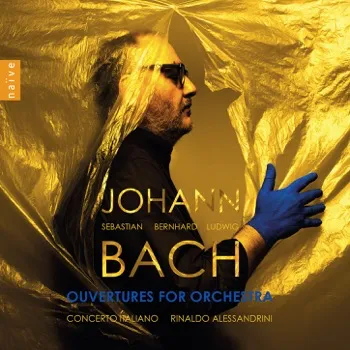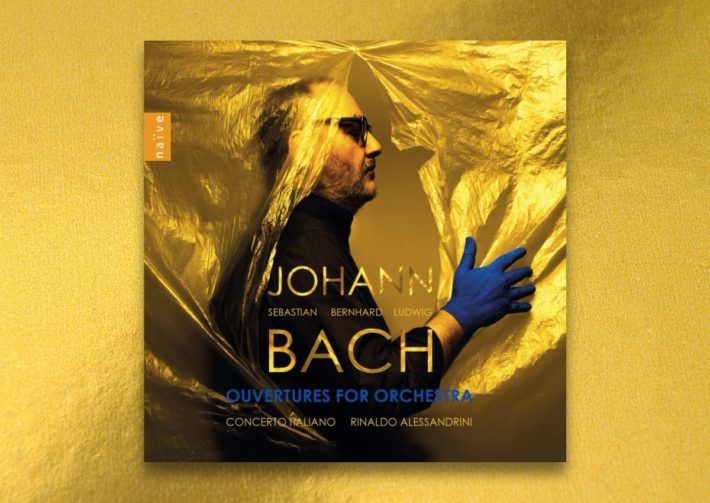Admirers of the Concerto Italiano / Alessandrini Brandenburg Concertos album have had to wait almost fifteen years for a follow up recording of Bach’s four orchestral suites (“overtures”). It has now arrived, and perhaps as a reward for our patience, the new album includes performances of two other suites by members of the Bach extended family. While Concerto Italiano and Alessandrini bring their customary technical excellence and passion to these works, they perform the suites using only one player per part (OPPP), an unsettled and contentious scholarly choice that may dissatisfy prospective listeners.

According to the liner notes, argument for the OPPP approach is largely based on the materials that have come down to us. In short, if the surviving parts for the Suite in C Major have only one copy of each string part, isn’t it likely that the part was played by a single player? (Why not at least two? And surely some of the parts could have gone missing in the last 170-plus years?) It is surely well within the performer’s rights to accept and perform this way, but the notes make it seem this is a largely settled argument, which is not the case.
There are undoubtedly many benefits to the OPPP approach. There is certainly a heightened clarity of texture, allowing us to hear and admire Bach’s contrapuntal mastery. Inner lines are more easily heard, and the performances have a lightness and buoyancy that are infectious. Alessandrini and his players offer playing of refined beauty and power; indeed, the technical accomplishment of the performances is even more impressive than in their Brandenburg set. And in many instances, Alessandrini’s tempo choices were unexpectedly slow. Gone are the days when historically informed performances meant performing every movement as quickly as possible (a charge one can level at many of the Cologne Musica Antiqua / Goebel recordings).
The final movement of the B minor Suite (CD 2, track 18) proves to be an excellent example. Alessandrini’s tempo is perfect, allowing flutist Laura Pontecorvo to incorporate engagingly varied articulation into her performance of her melismatic line. In comparison, the faster tempo in the well-regarded performance by the Freiberg Baroque Orchestra comes across as virtuosic but a bit bland, whereas the even slower tempo Egarr and his Academy of Ancient Music choose robs the music of its buoyancy, in a performance that remains stubbornly earthbound. What comes across most clearly in these new performances is a true feeling of consort playing – these are lived in, intelligent and deeply felt interpretations.
Despite repeated listening, the larger-orchestrated suites (Nos. 3 and 4, both in D Major) never fully convince. The Bach Collegium Japan performances, utilizing a full ensemble of strings, offer performances of both suites with impassioned, imposing regal power, a color and affect simply unavailable in an OPPP performance. Yes, the violin playing in the fast sections in third overture’s first movement (CD 1, track 1) are dispatched with breathtaking precision, but the extra frisson that comes when an ensemble of violins plays those same passages with a matching level of exactness is not there. There is an undeniable loss of timbral variety and power in these OPPP performances at the very moments where those qualities are most desired.
The recording is well engineered, the players closely miked, ensuring there are no balance issues. But one is left wondering if this is the result of exceptional musicians, careful engineering, or a combination of both?
The suites by Johann Bernhard and Johann Ludwig are pleasant listening, if not newly discovered masterpieces. It was certainly enjoyable to hear them, especially in such alert and thoughtful performances.
This recording will likely divide opinion. There are many benefits to hearing Bach’s suites performed OPPP, and these new performances struck me as more invigorating, intimate, and insightful than the other OPPP recordings. Ultimately the potential buyer must decide whether this historically informed idea brings more benefits than limitations. This may best be considered a thought-provoking alternative that does not supplant numerous excellent versions, Bach Collegium Japan and Freiberg Baroque Orchestra chief among them.
Johann Sebastian Bach – 4 Orchestra Suites
Johann Bernhard Bach: Suite No. 3 in E minor
Johann Ludwig Bach: Overture in G Major
Concerto Italiano
Rinaldo Alessandrini – Conductor
Naïve, CD OP30578




















